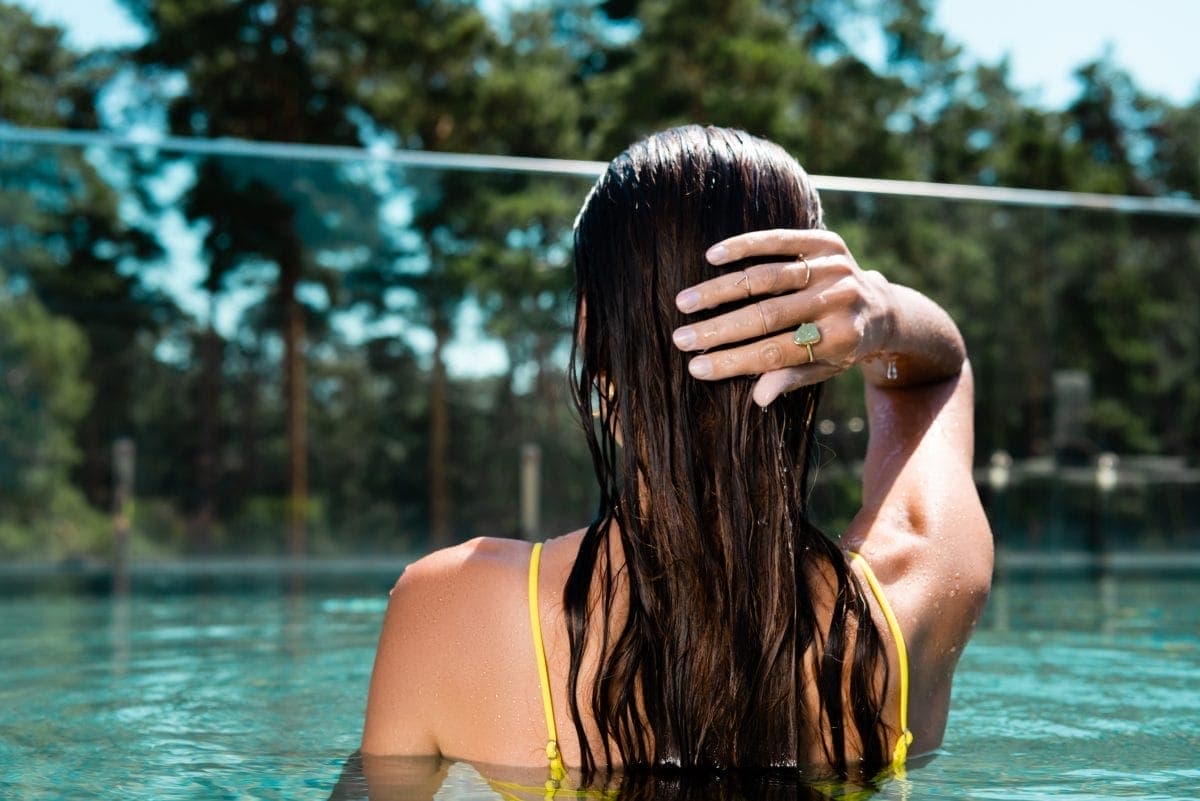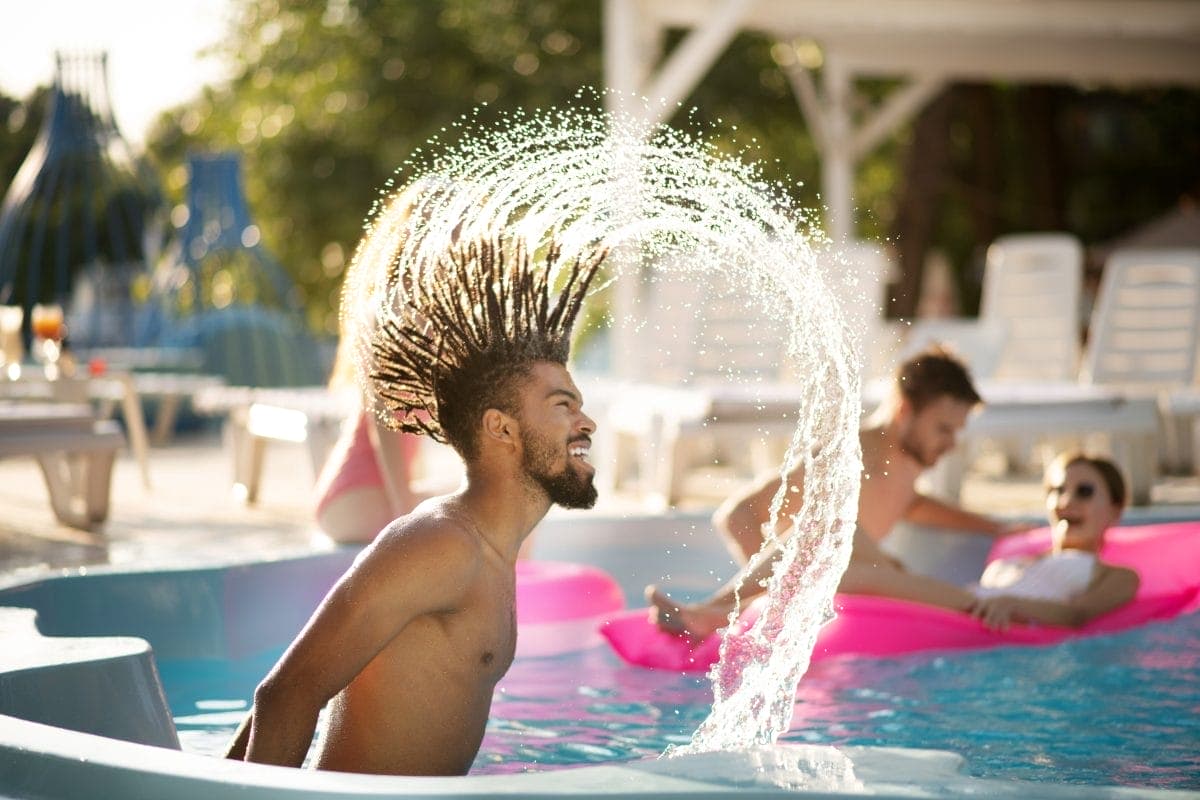Trends & Opinions
How Does Swimming Affect Your Hair and What are Some Great Products to Avoid Damage?
If you click on links we provide, we may receive compensation.
Swimming is a popular activity enjoyed by many, but it can take a toll on your hair. The chemicals and minerals in pool water, particularly chlorine, can cause significant damage if proper precautions are not taken. Understanding the effects of swimming on your hair and knowing which products can help mitigate these effects is essential for maintaining healthy locks.
How Swimming Affects Your Hair
When you swim in a pool, your hair is exposed to chlorine, a chemical used to keep the water clean. While chlorine is effective at killing bacteria, it also strips the natural oils from your hair, leading to dryness and brittleness. Chlorine can also cause your hair to become more porous, making it more susceptible to damage from brushing, styling, and environmental factors.
Saltwater pools and the ocean can also affect your hair. Saltwater can dehydrate your hair, leading to dryness and split ends. The salt can also leave a residue on your hair, making it feel gritty and difficult to manage. Over time, exposure to saltwater can weaken the hair shaft, causing breakage.
Hair color can be particularly vulnerable to the effects of swimming. Chlorine and saltwater can strip color-treated hair of its vibrancy, leading to fading and discoloration. Blonde hair is especially prone to turning green due to the reaction between chlorine and the copper found in pool water. This is not only unsightly but also indicates damage to the hair shaft.
Protecting Your Hair Before Swimming
One of the best ways to protect your hair from the damaging effects of swimming is to create a barrier before you enter the water. Wet your hair with fresh water before swimming. Hair that is already saturated with water will absorb less chlorine or saltwater. This simple step can significantly reduce the amount of damage your hair sustains.
Using a leave-in conditioner or hair oil can also provide a protective layer on your hair. Products that contain natural oils like coconut oil, argan oil, or jojoba oil are particularly effective. These oils can help to lock in moisture and create a barrier between your hair and the pool water. Look for products that are specifically formulated for swimmers, as they often contain ingredients that help to repel chlorine and salt.
Wearing a swim cap is another effective way to protect your hair. While a swim cap may not completely keep your hair dry, it can significantly reduce the amount of water that encounters your hair. Swim caps are available in a variety of materials, including silicone, latex, and Lycra. Silicone caps are generally considered to be the most effective at keeping water out.
Caring for Your Hair After Swimming
After swimming, it is important to rinse your hair thoroughly with fresh water as soon as possible. This helps to remove chlorine, salt, and other impurities from your hair. A good rinse can prevent these substances from sitting on your hair and causing further damage.
Using a swimmer-specific shampoo and conditioner can help to remove chlorine and other chemicals from your hair. These products are formulated to gently cleanse the hair without stripping it of its natural oils. Look for products that contain ingredients like vitamin C, which can help to neutralize chlorine, and aloe vera, which can soothe and moisturize the scalp.
Deep conditioning treatments are essential for restoring moisture to your hair after swimming. Using a deep conditioner once a week can help to repair damage and keep your hair healthy. Look for products that contain nourishing ingredients like shea butter, keratin, and proteins, which can help to strengthen and hydrate your hair.



Recommended Products for Swimmers
One highly recommended product for swimmers is the UltraSwim Chlorine Removal Shampoo. This shampoo is specifically designed to remove chlorine and other chemicals from your hair. It contains vitamin E and aloe vera, which help to moisturize and soothe your hair and scalp. Regular use of this shampoo can help to keep your hair healthy and prevent chlorine damage.
For those looking for a conditioner, the Ion Swimmer’s Leave-In Conditioner is a great option. This product helps to detangle and condition your hair while providing a protective barrier against chlorine and saltwater. It contains vitamins and proteins that help to strengthen your hair and keep it hydrated.
A deep conditioning treatment like the Neutrogena Triple Moisture Deep Recovery Hair Mask can be beneficial for swimmers. This mask contains a blend of natural oils, including olive, meadowfoam seed, and sweet almond, which help to nourish and repair your hair. Using this mask once a week can help to restore moisture and improve the overall health of your hair.
Natural Remedies and Tips
In addition to commercial products, there are several natural remedies that can help to protect and repair your hair from swimming damage. One effective remedy is a coconut oil treatment. Apply a generous amount of coconut oil to your hair before swimming. The oil will create a protective barrier and help to lock in moisture. After swimming, rinse your hair and follow with a gentle shampoo and conditioner.
Apple cider vinegar can also be used to remove chlorine and restore the natural pH balance of your hair. Mix one part apple cider vinegar with four parts water and use it as a rinse after swimming. This can help to remove chlorine buildup and leave your hair feeling soft and shiny.
Another tip is to avoid using heat styling tools on your hair after swimming. The combination of chlorine or saltwater and heat can cause further damage to your hair. Instead, let your hair air dry or use a blow dryer on a low heat setting. This can help to prevent additional dryness and breakage.
The Importance of Hydration and Diet
Maintaining a healthy diet and staying hydrated are also important for keeping your hair healthy. Drinking plenty of water helps to keep your hair hydrated from the inside out. Eating a balanced diet that includes plenty of vitamins and minerals can also support healthy hair growth. Foods that are rich in omega-3 fatty acids, such as salmon and flaxseeds, can help to keep your hair strong and shiny.
Incorporating supplements like biotin and collagen into your diet can also benefit your hair. Biotin, also known as vitamin B7, is essential for healthy hair growth. Collagen helps to strengthen the hair shaft and improve elasticity. Taking these supplements regularly can help to improve the overall health of your hair.
The Role of Professional Treatments
For those who swim frequently, professional treatments can be an effective way to protect and repair your hair. Keratin treatments, for example, can help to strengthen and smooth your hair. These treatments can provide long-lasting protection against chlorine and saltwater damage. Consult with a professional stylist to determine which treatment is best for your hair type and needs.
Regular trims are also important for maintaining healthy hair. Trimming your hair every six to eight weeks can help to prevent split ends and breakage. This can also help to keep your hair looking healthy and vibrant.
Final Thoughts
Swimming can have a significant impact on your hair, but with the right precautions and products, you can protect and maintain healthy locks. By understanding the effects of chlorine and saltwater on your hair and incorporating protective measures into your routine, you can enjoy swimming without compromising the health of your hair. Remember to use swimmer-specific products, natural remedies, and professional treatments to keep your hair strong, hydrated, and damage-free. By following these tips, you can enjoy the benefits of swimming while keeping your hair in top condition.
In summary, swimming is a great way to stay fit and have fun, but it can be harsh on your hair. Protecting your hair before swimming, caring for it properly afterward, and using the right products can make a big difference. Whether you prefer commercial products or natural remedies, there are plenty of options to help you keep your hair healthy and beautiful. Stay hydrated, eat a balanced diet, and consider professional treatments if needed. With these strategies, you can enjoy the water without worrying about your hair.




